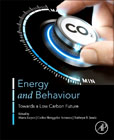
Energy and Behavior: Towards a Low Carbon Future
Lopes, Marta
Henggeler Antunes, Carlos
Janda, Kathryn B.
Energy behaviour and end-use energy efficiency are gaining importance in our understanding of how to promote a transition to a low carbon and more sustainable future. This collection represents an international and multi-faceted approach to understanding and engaging people in the energy system. Energy and Behaviour: Towards a Low Carbon Future offers: (1) a succinct introduction to the major disciplinary and interdisciplinary approaches to this field, (2) a critical examination of evolving quantitative methods to address this socio-technical challenge, and (3) new areas where additional evidence is needed for interventions and policy-making. Energy and Behaviour provides a primer for new entrants in the energy-efficiency and behaviour field, particularly those taking a quantitative approach to the topic. Concurrently, it recognizes ecological economist Herman Daly's insight: what really counts is often not countable. By acknowledging and exploring this ongoing tension in the field, the book provides a critical resource for researchers, postgraduate students, practitioners and policy makers. Features disciplinary and interdisciplinary perspectives?Includes a cross-sectoral overviewProvides a selection of modelling approachesExamines the importance of interventions, policies and regulatory design INDICE: PART 1 - COMPLEMENTARY VIEWS ON ENERGY BEHAVIOUR 1. Psychology and energy conservation: Key contributions from theory and practice 2. Behavioural economics for energy and climate change policies and the transition to a sustainable energy use: A Scandinavian perspective 3. A critical review of energy behaviour change: The influence of context 4. About and beyond energy behaviour: What social scientists want you to know PART 2 - ENERGY BEHAVIOUR ACROSS END-USE SECTORS 5. The challenge of energy efficiency in the building sector: Taking an in-depth look at decision-making on investments in energy-efficient refurbishments 6. Resource-efficient non-domestic buildings: Intertwining behaviours and technology 7. Reframing energy efficiency in industry: A discussion of definitions, rationales and management practices 8. What do we know about the role of human dimensions on sustainable energy for transport? 9. The impact of the institutional context on the potential contribution of new business models to democratizing the energy system 10. Energy, activity and knowledge in the city: Addressing some challenges posed by smart city concepts 11. Urban low-carbon futures: A real lab experiment in Berlin PART 3 - MODELLING ENERGY BEHAVIOUR 12. Energy and enjoyment: The value of household electricity consumption 13. Developing quantitative insights on building occupant behaviour: Supporting modelling tools and datasets 14. Agent-based modelling of the social dynamics of energy end-use 15. Preference elicitation approaches for energy decisions PART 4 - PROMOTING BEHAVIOUR CHANGE 16. Behaviour in US energy programs 17. Overview of the European Union policies to promote more sustainable behaviours in energy end-use Conclusion
- ISBN: 978-0-12-818567-4
- Editorial: Academic Press
- Encuadernacion: Rústica
- Páginas: 408
- Fecha Publicación: 01/11/2019
- Nº Volúmenes: 1
- Idioma: Inglés
